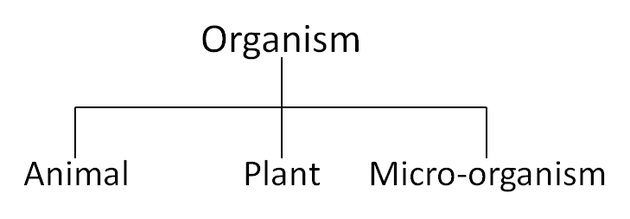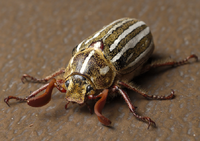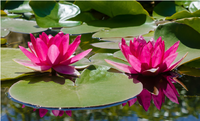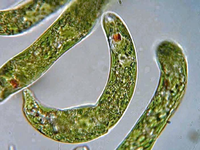Organism
Contents
Key Stage 1
Meaning
An organism is a living thing.
Key Stage 2
Meaning
An organism is any living creature.
About Organisms
- There are many different types of organisms.
- Organisms can be grouped by common features.
| Animals need to eat other creatures to survive. | Plants can make their own food. | Micro-organisms are too small to see with they eye, so you need a microscope to see them. |
Key Stage 3
Meaning
An organism is any living creature that functions independently.
About Organisms
- All organisms are made of cells.
- If an organism is made of one cell it is called a Unicellular Organism.
- If an organism is made of many cells it is called a Multicellular Organism.
References
AQA
OCR
- Organisms; classification systems, pages 174-175, Gateway GCSE Biology, Oxford, OCR
- Organisms; energy transfer, page 130, Gateway GCSE Biology, Oxford, OCR
- Organisms; genetic engineering, pages 200-203, Gateway GCSE Biology, Oxford, OCR
- Organisms; genetically modified, pages 204-205, Gateway GCSE Biology, Oxford, OCR
- Organisms; identification keys, page 181, Gateway GCSE Biology, Oxford, OCR
- Organisms; indicator species, pages 190-191, Gateway GCSE Biology, Oxford, OCR
Beyond the Curriculum
The Fascinating World of Microorganisms
While you've learned about organisms, there's a hidden world that's rarely explored in early education:
Microorganisms: Nature's Tiny Wonders
- Microorganisms, or microbes for short, are organisms so small they can only be seen with a microscope. They come in various forms, including bacteria, viruses, and fungi. Some microbes are essential for life, like the bacteria in our gut that help with digestion. Others can cause diseases, highlighting the importance of good hygiene.
Extremophiles: Life in Extreme Conditions
- Imagine living in extreme environments like boiling hot springs, acidic lakes, or deep-sea hydrothermal vents. Some organisms, known as extremophiles, thrive in these harsh conditions. They've adapted to survive where most life would perish, expanding our understanding of where life can exist.
The Unity of Life: Cells and DNA
As you progress in your science education, you'll discover the fundamental building blocks of organisms:
Cells: The Tiny Units of Life
- All organisms, whether unicellular or multicellular, are composed of cells. Cells are like the bricks that build the structure of life. They come in various shapes and sizes and perform specialized functions. Studying cells reveals the intricate machinery of living organisms.
DNA: The Genetic Blueprint
- Deoxyribonucleic acid (DNA) is a molecule that carries the genetic information for all living things. It's like a complex code that determines an organism's traits and characteristics. Understanding DNA has revolutionized fields like genetics and biotechnology, opening doors to genetic engineering and personalized medicine.
The Web of Life: Ecosystems and Biodiversity
Beyond the basics, you'll explore the interconnectedness of organisms in the natural world:
Ecosystems: Nature's Communities
- An ecosystem is like a living neighborhood, where organisms interact with each other and their environment. From lush rainforests to arid deserts, ecosystems vary widely, and studying them helps us understand the delicate balance of life on Earth.
Biodiversity: Earth's Rich Tapestry
- Biodiversity refers to the variety of life on our planet. It encompasses the millions of species, from insects to mammals, and the genetic diversity within them. Preserving biodiversity is essential for the health of ecosystems and the well-being of all organisms, including humans.
As you advance in your scientific journey, these exciting concepts will become more prominent. They represent the frontiers of biological science, where researchers continue to make groundbreaking discoveries and expand our knowledge of the fascinating world of organisms.



